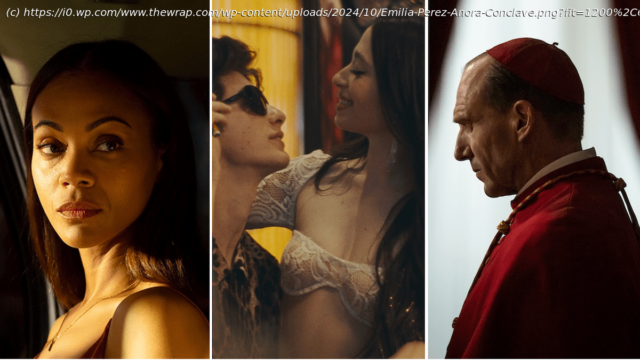Here are our early predictions in an Academy Award Best Picture race that doesn’t have any real frontrunners.
This year’s awards race has no strikes, no pandemic and no postponed or canceled awards shows.
At this point, it also has no real frontrunners.
So far, 2024 has been a down year at the box office and a confusing year on the film festival circuit. Before the fall festivals, the Oscar race was something of a waiting game, with everybody curious about the potential contenders that would be unveiled in Venice, Telluride and Toronto.
And now that those festivals have run their course, it’s a different kind of waiting game: waiting to see which films can start feeling like serious contenders rather than long-to-medium shots.
There’s no big commercial movie out there with the clout that “Oppenheimer” and “Barbie” showed last year. And no indie film that seems to have the buzz to become this year’s “CODA” or “Everything Everywhere All at Once.”
Instead, the race is a whole bunch of maybes: maybe this movie will catch on with awards bodies, maybe that yet-unseen movie will be a no-doubter, maybe the international voters that have transformed Academy membership over the last six years will make bold choices …
It’s October, Oscar voting begins in a little more than three months, and the big show will take place in about five. So here’s a look at the components of this year’s race so far.
Apart from “The Godfather Part II” and “The Lord of the Rings: The Return of the King,” sequels don’t win Best Picture. And more often than not, they don’t get nominated, either: Since the Best Picture roster was expanded from five to 10 in 2009, only four of the 136 nominees have been sequels. (Those four were “Toy Story,” “Mad Max,” “Top Gun” and “Avatar” sequels.)
But four massive sequels are hitting screens in 2024, three of them already out. Of those three, Denis Villeneuve’s “Dune: Part Two” seems to be the best bet, considering that its predecessor received 10 nominations and led all films with six wins in 2021. “Furiosa: A Mad Max Story” seemed to have less of an impact when it was released after the Cannes Film Festival, while “Joker: Folie à Deux” received wildly mixed reviews in Venice and could be a tough sell to voters as it shifts in and out of fantasy and in and out of musical numbers set to classic pop songs, all within the framework of what is essentially a courtroom drama for its second hour.
“Gladiator II,” the long-delayed sequel to Ridley Scott’s 2000 Best Picture winner, hasn’t screened yet but has to be considered a strong contender. But it’s worth noting that Scott has made 18 movies in the 24 years since the first “Gladiator,” and only one of them, 2015’s “The Martian,” was nominated for Best Picture. “Gladiator II” will need to recapture some of that “Gladiator I”/”Martian” mojo rather than remind viewers of his last two films, “House of Gucci” and “Napoleon.”
Two movies came out of the Cannes Film Festival with a seemingly clear path to Best Picture nominations. Sean Baker’s “Anora,” the Palme d’Or winner, is the raucous, very funny and unexpectedly moving story of a sex worker who gets involved with the son of a Russian oligarch. It might have been too wild and too sexual for the old Academy, but it shouldn’t be a problem for the current membership. And with the organization now increasingly international, things also look good for French director Jacques Audiard’s Spanish-language “Emilia Perez,” a full-fledged musical about a Mexican cartel leader who undergoes sex reassignment surgery.
A couple of other films – like “Emilia Perez,” their home countries’ entries in the Oscars’ Best International Feature Film race – also premiered at festivals and have an outside chance of picking up some Best Picture heat. “I’m Still Here,” a wrenching family story set in Brazil during the military dictatorship in the 1970s, is the first film in more than a decade from “Central Station” and “The Motorcycle Diaries” director Walter Salles, and it won raves in Venice and Toronto. Mohammad Rasoulof’s “The Seed of the Sacred Fig,” which focuses on an Iranian judge whose promotion puts him in an ethical quandary, is a dark horse. But the director’s own story may give it a boost. Identified by the state as a dissident, he was sentenced to be flogged and imprisoned, and fled the country ahead of his film’s Cannes premiere.
Of the other films that premiered in Venice, Telluride and Toronto, the one with the most buzz is probably Brady Corbet’s “The Brutalist,” a three-and-a-half-hour epic (with built-in intermission) starring Adrien Brody as a European architect who comes to the U.






